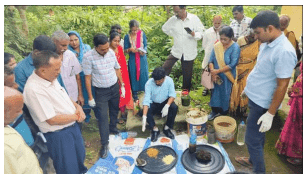Sri Vijaya Puram: In a move aimed at mainstreaming sustainable agriculture practices in the islands, the Department of Animal Husbandry and Veterinary Services (AH&VS), in collaboration with the Agriculture Department, organized a training-cum-demonstration on natural farming techniques at Ferrargunj on July 14, 2025. The session, attended by farmers and local panchayat representatives, was focused on the preparation and application of indigenous bio-inputs such as Jeevamrut and Neemastra.
The initiative forms part of the administration’s broader effort to shift agricultural practices away from chemical inputs and toward regenerative systems that enhance soil fertility and reduce environmental impact. The event drew active participation from Gram Panchayat Ferrargunj, with PRI members including the Pramukh and Samiti members in attendance.
Senior Veterinary Officer Dr. Satish Kumar led the technical session, explaining the principles behind natural farming and the specific preparation steps for bio-inputs. He elaborated on the benefits of Jeevamrut, a fermented microbial solution made from cow dung, cow urine, jaggery, gram flour, and soil, as a cost-effective alternative to chemical fertilizers. The session also covered the preparation of Neemastra, an organic pesticide made from neem leaves, cow urine, and water.
Complementing the technical discussion, Agriculture Officer Ravi Sutradhar provided step-by-step guidance on ingredient ratios, preparation timing, and application methods. The goal was to enable farmers to adopt these low-cost, farm-based inputs using materials readily available in their surroundings.
Participants received 2 litres of Jeevamrut produced at the Livestock Farm Complex in Dollygunj and bottles of Neemastra provided by the Agriculture Department. Farmers were encouraged to replicate the process on their own farms and raise further queries during a Q&A round, which was actively utilized.
Dr. Sunita Roy from AH&VS also briefed participants on the department’s broader efforts to promote natural farming across the UT, particularly in dairy-linked households. Dr. Subhash Palve urged farmers to keep at least one cow or buffalo for daily milk needs and bio-input preparation, thus creating a closed-loop farm economy.
The event had a community-driven tone, with Panchayat Pramukh Padmawati appreciating the inter-departmental coordination and calling for similar training sessions in other panchayats. The presence of elected representatives was seen as a confidence booster for farmers who often hesitate to adopt new techniques without grassroots endorsement.
Natural farming, as an approach, is gaining traction in various parts of the country under programs such as Subhash Palekar’s Zero Budget Natural Farming and state-led regenerative agriculture policies. In the context of the Andaman and Nicobar Islands, where transport costs inflate prices of chemical inputs, locally made bio-solutions offer a sustainable and economical alternative.
Ferrargunj, with its mix of small-scale farmers and agro-pastoral families, has been identified as a potential pilot cluster for expanding these techniques. Officials believe that improving soil health, reducing pesticide residue, and enhancing yield stability could significantly benefit farmers in the long term, especially as climate variability continues to impact agriculture in the islands.
The departments involved indicated that follow-up sessions will be conducted periodically, along with field assessments to track adoption levels. The outcome of such programs could also feed into future policy on organic certification, local input subsidies, and agriculture credit linkages.
As Andaman’s farming community explores low-cost, eco-friendly options, hands-on training sessions like the one in Ferrargunj are likely to play a key role in shaping a self-reliant and sustainable farm ecosystem in the islands.





